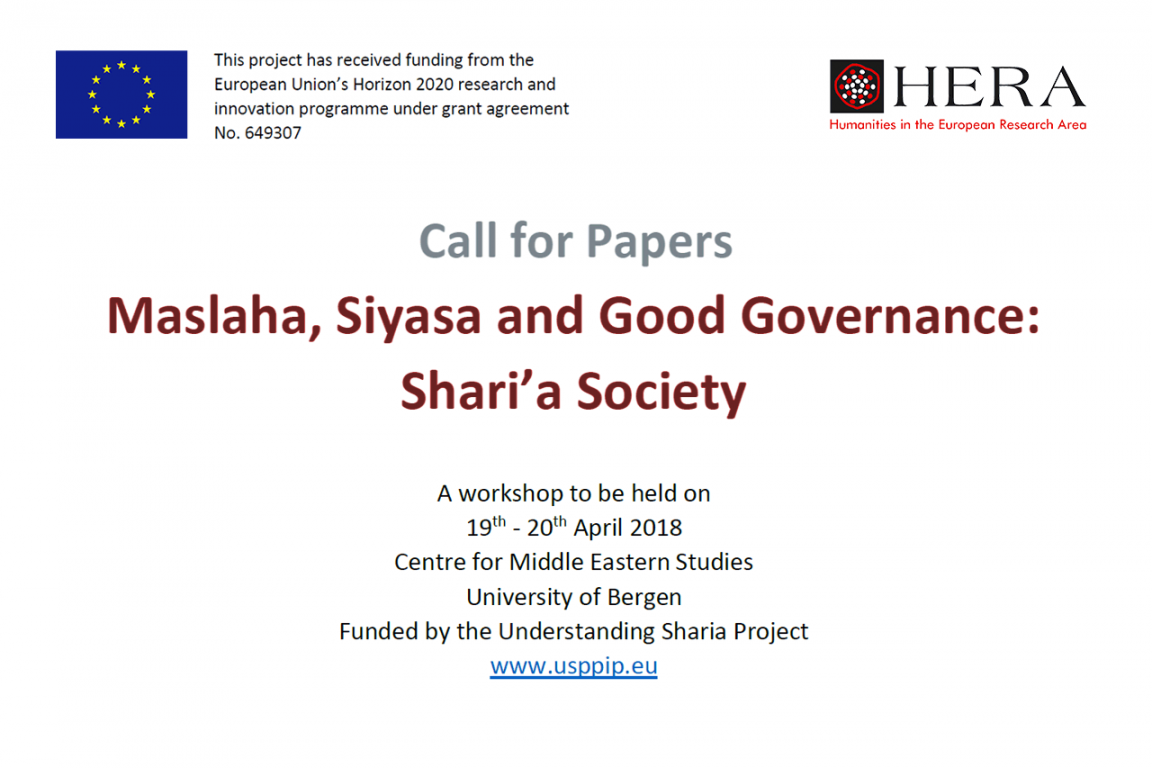Maslaha, Siyasa and Good Governance: Shari’a and Society Workshop

About The Event
Call for Papers
Date: April 19-20, 2018
Venue: The Centre for Middle Eastern Studies, University of Bergen, Bergen, Norway
Funded by: The Understanding Sharia Project (USPPIP)
Abstract Submission Deadline: October 30, 2017
We are pleased to announce the Call for Paper proposals for this two-day event organized as part of the Humanities in the European Research Area (HERA) “Uses of the Past” joint research program.
A challenge for the Islamic Shari’a is that it should span from a religious ideal to a social and political reality. Islamic thinkers have long discussed whether this should primarily take the form of a fixed set of rules to be applied “because God has said so”, or whether these rules reflect a divine intention (Ar. maqasid) which humans can grasp, the intention of welfare for mankind (maslaha). If the latter, should Muslims seek the rules and methods that best furthers these intentions in contemporary society? This has been a central issue for reform and modifications of Islamic practices for centuries, as well as today.
Linked to this discussion is the issue of authority. The Shari’a gives the state (the “ruler”) the authority to implement rules and make decisions beyond the literal rules of the Shari’a when they follow its intentions, this is called siyasa shar’iya, “Shari’a politics”. How the limits for the state’s freedom of action within Shari’a thinking goes, depends on the relationship between the ruler and the religious authorities at any time.
How are these topics discussed today? This workshop will focus on the use of concepts such as maslaha and siyasa in Islamic discussion of reform and orthopraxy. To what degree do Islamic NGOs appeal to maslaha in their activities? To what degree do Muslim thinkers today use the terms of siyasa and maslaha in their discussions of state activities and laws in Muslim, mixed and non-Muslim states? A central concept for many state-oriented NGOs is “good governance”. This term, which may be used for accountability of the ruler, or more widely for works promoting democratic practices, is in many ways akin to “promotion of public welfare”, i.e. maslaha.
The object of this workshop is to see the relationship between these modern ideas of reform and the classical fiqh debates on the same topics. Do modern Islamic thinkers refer to the classical debates at all; and if so, are the fiqh concepts simply used as rhetoric, putting a classical name to a modernist concept, or are contemporary debates informed about the classical fiqh argument? How is the fiqh debates of the past used in the present?
Keynotes Speakers
- Felicitas Opwis, Georgetown University
- Mohammad Fadel, University of Toronto
Abstracts should be submitted to www.usppip.eu/bergen/ before Monday 30th October 2017. Those giving papers selected for the workshop will have travel expenses and accommodation/subsistence provided by the USPPIP project.
Source: Understanding Sharī`a- Past Perfect, Imperfect Present (USPPIP Project)
Location
The Centre for Middle Eastern Studies, University of Bergen


We're always eager to hear from you.
If you’d like to learn more about us or have a general comments and suggestions about the site, email us at